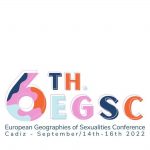 The 6th European Geographies of Sexualities Conference; Ruth Blatt and Gilly Hartal (The Gender Studies Program, Bar-Ilan Univ. ) (Web)
The 6th European Geographies of Sexualities Conference; Ruth Blatt and Gilly Hartal (The Gender Studies Program, Bar-Ilan Univ. ) (Web)
Time: 14.-16.09.2022
Venue: Cádiz, Spain
Proposals by: 27.03.2022
The 6th European Geographies of Sexualities Conference has the theme „Embodied Geographies of Differences: Trans* Spaces, Identities and Solidarities“. Ruth Blatt and Gilly Hartal (The Gender Studies Program, Bar-Ilan University) posted the following call for papers for the session „Decentering Allies: Negotiating Binaries in Solidarity to LGBT+ Subjects and Activisms“:
Allies play an important role in virtually every fight to end oppression. Yet they are often criticized by those they are allied with for reinforcing binaries and recreating colonial models of saviorism that maintain their relative social power (Ahmed, 2004; Blair, 2021). Specifically, within LGBT+ struggles, allyship is negotiated and contested (Mathers, 2017; Spade, 2020; Mathers et al., 2015), raising questions as to the different interests, social and symbolic boundaries and discourses that produce this power relations.
Looking at allyship from a spatial perspective, this session explores allyship’s paradoxical nature in both strengthening and weakening social inequalities. The session will address the meaning of allyship for varied LGBT+ communities along lines of race, ability, class, and incarcerated status. The goal of the session is to advance a conceptualization of allyship that decenters the allies‘ perspective and is sensitive to unequal structures of power and privilege. This in turn advances our conceptualization of allyship in relation to concepts such as homonormativity, care, activism, safe spaces, center/periphery divides and more, across diverse locations.
Relevant topics include but are not limited to:
- Allies and activism
- Allies and media
- Allies and institutional settings
- Allies and safe spaces
- Cisgender and transgender allyship
- Allies and LGBTQ+ subjectivities
- Allyship and the construction of queer spaces
- Allyship and nightlife
- Allyship and tourism
- Allyship and queer mobility and migration
- Allyship and geopolitics
- Representations of allies and allied
- Allyship from a post-colonial and non-Western perspective
- Non-colonizing approaches to allyship
- The meaning and impact of allyship in activist, online or mass media spaces or in institutional settings
- How different spaces enable LGBT+ subjects to cultivate cisgender and straight allies, while at the same time proactively shaping their own representation
- Productive and counter-productive spaces for queer allyship
Please send an abstract of 250 words, contact information (email and institutional affiliation), and a short bio by March 27th, 2022 to ruth.blatt@gmail.com. Decisions letters will be sent by April 17th.
More information on the conference can be found here: https://2022.egsconference.com/
Please let the chairs know if you have any questions.
References
- Ahmed S (2004) Declarations of whiteness: The non-performativity of anti-racism. borderlands e-journal 3(2).
- Blair K (2021) Empty Gestures: Performative Utterances and Allyship. Journal of Dramatic Theory and Criticism 35(2): 53-73.
- Mathers LA, Sumerau JE and Ueno K (2015) ?This isn?t just another gay group?: Privileging heterosexuality in a mixed-sexuality LGBTQ advocacy group. Journal of Contemporary ethnography 47(6): 834-864.
- Mathers LAB (2017) Bathrooms, Boundaries, and Emotional Burdens: Cisgendering Interactions Through the Interpretation of Transgender Experience. Symbolic Interaction 40(3): 295-316.
- Spade D (2020) Solidarity Not Charity: Mutual Aid for Mobilization and Survival. Social Text 38(1): 131-151.
Source: Qstudy-l
